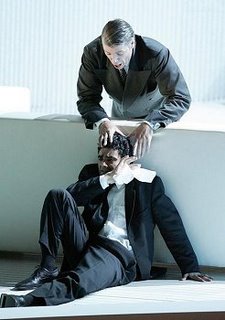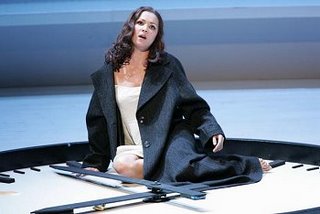Style Instead of Glamour in Willy Decker's La Traviata
 G.Verdi, La Traviata, C.Rizzi / WPh Director: W.Decker A.Netrebko, R.Villazon, T.Hampson et al. DG / Unitel DVD     |
 And we react to her, because she is – foremost – stunningly beautiful, sexy and attractive. “We,” because classical music, more so still than other trades, is largely driven by the actions and opinions of men, “we” because those among us that are not heterosexual lustmongers who have channeled their urges into expression through or appreciation of art, are homosexual aesthetes similarly taken in by grace and good looks. “We,” because the kind of beauty generated by Netrebko in this particular setting is of a kind that transcends gender and sexuality. We all react to that which pleases the eye and imagination. And when the visual feeds into heart or groin, the ear will nod in timid agreement, little matter the fare it is served. In a sense, Netrebko is like a restaurant of great repute with the finest décor – where the food is good (never more) but all the right people meet. We take it as the greatest joy – and rightly so: let’s not feel guilty for being charmed by that which was designed by nature (and marketing people) to charm us. La Traviata with Netrebko is a sensual feast and deserves to be embraced as a whole.
And we react to her, because she is – foremost – stunningly beautiful, sexy and attractive. “We,” because classical music, more so still than other trades, is largely driven by the actions and opinions of men, “we” because those among us that are not heterosexual lustmongers who have channeled their urges into expression through or appreciation of art, are homosexual aesthetes similarly taken in by grace and good looks. “We,” because the kind of beauty generated by Netrebko in this particular setting is of a kind that transcends gender and sexuality. We all react to that which pleases the eye and imagination. And when the visual feeds into heart or groin, the ear will nod in timid agreement, little matter the fare it is served. In a sense, Netrebko is like a restaurant of great repute with the finest décor – where the food is good (never more) but all the right people meet. We take it as the greatest joy – and rightly so: let’s not feel guilty for being charmed by that which was designed by nature (and marketing people) to charm us. La Traviata with Netrebko is a sensual feast and deserves to be embraced as a whole. But what makes this Traviata great, is the direction, the set, and the acting. True, Netrebko has a tendency to over-act and forget the singing while she is at it, busily wiggling her toes or attempting somersaults. Fortunately here she does not attempt such feats. Against the wide, white semicircle that encloses the stage (a dream in simple elegance of design and texture) her reds and blacks are as vivid as lip-stick smears on champagne glasses and tuxedos. Her torment, too, becomes believable – not via a stuffy setting from the olden days but because the direction takes the drama from the social surroundings into Violetta Valéry herself – juxtaposed by a father-figure representing Death or Fate which is, in her case, one and the same. And while Violetta is a well-established modern woman, aware of her charms and what she can make men do because of them, she succumbs to a deeper self, the inner child that wishes itself a past innocence with wide and begging eyes, that still wishes to believe in all those things that her cynical veneer has long cast to the four winds. It is this that makes her believable to us, because we believe in an inner naturalness that does not feel like a merely acted front like with, for example, the insufferably self-obsessed Angela Gheorghiu.
But what makes this Traviata great, is the direction, the set, and the acting. True, Netrebko has a tendency to over-act and forget the singing while she is at it, busily wiggling her toes or attempting somersaults. Fortunately here she does not attempt such feats. Against the wide, white semicircle that encloses the stage (a dream in simple elegance of design and texture) her reds and blacks are as vivid as lip-stick smears on champagne glasses and tuxedos. Her torment, too, becomes believable – not via a stuffy setting from the olden days but because the direction takes the drama from the social surroundings into Violetta Valéry herself – juxtaposed by a father-figure representing Death or Fate which is, in her case, one and the same. And while Violetta is a well-established modern woman, aware of her charms and what she can make men do because of them, she succumbs to a deeper self, the inner child that wishes itself a past innocence with wide and begging eyes, that still wishes to believe in all those things that her cynical veneer has long cast to the four winds. It is this that makes her believable to us, because we believe in an inner naturalness that does not feel like a merely acted front like with, for example, the insufferably self-obsessed Angela Gheorghiu. Speaking of insufferably self-obsessed: Thomas Hampson is a very fine Germont (would it have hurt him to look like he believed in the production, though?) and Villazón’s Alfredo meets Netrebko’s acting every step of the way: innocent, helplessly nasty, broken, and lovelorn. No actor could probably make his initial obsession seem real, but that part of the opera is quickly gotten past. What remains are two hours of opera as it should be: involving, beautiful, musical, a drama even the un-inclined are willing to follow, mainly because it casts out the dusty scraps that ‘tradition’ thoughtlessly passes down and instead successfully focuses on a very few, but the right essentials: beauty, emotion, and – of course – music. (Carlo Rizzi and the Vienna Philharmonic apply the necessary musical touches.) For those who don’t fall for the empty glitz of Zefirelli productions, Willy Decker's on this DVD is mandatory viewing and makes the CD alone not worth owning.
Speaking of insufferably self-obsessed: Thomas Hampson is a very fine Germont (would it have hurt him to look like he believed in the production, though?) and Villazón’s Alfredo meets Netrebko’s acting every step of the way: innocent, helplessly nasty, broken, and lovelorn. No actor could probably make his initial obsession seem real, but that part of the opera is quickly gotten past. What remains are two hours of opera as it should be: involving, beautiful, musical, a drama even the un-inclined are willing to follow, mainly because it casts out the dusty scraps that ‘tradition’ thoughtlessly passes down and instead successfully focuses on a very few, but the right essentials: beauty, emotion, and – of course – music. (Carlo Rizzi and the Vienna Philharmonic apply the necessary musical touches.) For those who don’t fall for the empty glitz of Zefirelli productions, Willy Decker's on this DVD is mandatory viewing and makes the CD alone not worth owning. 






















































3 comments:
I have to say I think that the paragraph about who 'we' are is a load of tosh. Just because you're a heterosexual male doesn't mean that women don't watch opera live or on DVD. Especially older women. The sort who are normally invisible to the tosh-talking heterosexual male that you are projecting yourself to be.
I'm sorry of this comes over as a sort of flame, but this sort of crap is really not good enough for a usually thoughtful and sensitive blog like ionarts that wants to put itself a bit above the gosippy 'me me me' of most of the operablogosphere. If you fancy Anna Netrebko just say it, it's not a big deal, plenty of blokes do. And loads of people who don't fancy her still admire her
For a while, dear 'Gert', I was afraid a piece of mine on Verdi would go by without controversy. Thankfully not so. Quite regardless of what I project myself to be (and I *do* notice older women, especially when they are the mothers of younger women... but also and even on their own), I find it a little disappointing that I am accused - indirectly as may be the case - of sexism or chauvinism, because it's just doesn't ring very true... because it's a little to easy to brush off.
Unless there is a person that want's to tell me of a business, an art, an occupation, a job, a world that is more sexist and chauvinistic than Opera, I can't take such an accusation seriously. I feel like having been criticised for pointing out that Liberace was gay; that Garfield is fat.
Opera is sexist, and it's always been sexist - and I comment on it, neither with approval nor particular disapproval. (Though the restaurant-analogy should have given away some sort of sensitivity to the subject.)
Quite frankly, I don't care how many old women watch opera, 'tis a sexist business and anyone who tells me sex doesn't sell (or that it isn't used intentionally to that purpose) is out of his or her mind.
And it isn't a quesiton of whether I fancy Anna Netrebko or not. (Fairly hefty calves, by the way... although generally very much appealing.) It's a question as to what purpose she has in the production - and to what extend she fulfills it. And her purpose is an aesthetic one, a sexually tinged one... and the reason the production was such a success is because it worked... because it appealed to a large enough crowd that constitutes the "We" that I so (provocatively?) describe. And that may, or may not include old women.
best,
jfl
Post a Comment